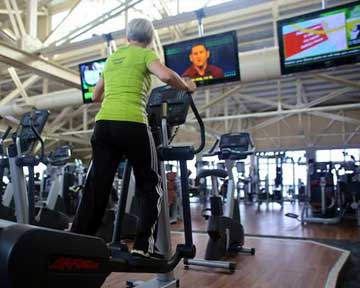What is Tendonitis?
Tendonitis is the process of inflammation and irritation of a tendon usually following damage to that tendon following injury or repetitive strain. Many of the symptoms of for Tendonitis are common to all Tendinopathy, often making it hard to distinguish from Tendinosis. The tendon itself is a strong fibrous band of tissue that connects muscle to bone, consequently there are thousands of tendons throughout the body. Tendonitis tends to develop in areas of increased movement or where the structures of the body expose the tendon closer to the surface tissues, such as in the ankle, knee and elbow joints.
Our specialist musculoskeletal physiotherapists here at Liverpool Physio are very experienced at assessing and treating tendonitis. Our modern facilities and individually tailored treatments will have you returning to the best possible condition in the shortest possible time.
 Above: Our physiotherpaists can provide you with a variety of exercises you can do at home to help ease the discomfort of your tendonitis.
Above: Our physiotherpaists can provide you with a variety of exercises you can do at home to help ease the discomfort of your tendonitis.What causes Tendonitis?
Tendonitis, or inflammation of the tendon, can occur as a result of injury to the tendon during intensive activity, such as sports. In these cases it is most often as a result of sudden, jerking movements like jumping, throwing, kicking or rapidly changing direction whilst running. Two commonly known types of tendonitis are lateral epicondylitis, often referred to as Tennis Elbow, and medial epicondylitis, often called Golfers Elbow. Many sports related cases of tendonitis are caused, or exacerbated by, poor technique.
Tendonitis can also develop more slowly though heavy repetition of normal daily activities such as writing, typing, PC mouse operation and other fine motor control skills. This type of tendonitis is commonly referred to as a repetitive strain injury.
Generally any specific activity that puts excess force through the tendons, a sudden increase in activity placing extra stress on a tendon or a history of injuries may increase your risk of developing tendonitis.
 Above: Our physiotherpaists can provide you with a variety of exercises you can do at home to help ease the discomfort of your tendonitis.
Above: Our physiotherpaists can provide you with a variety of exercises you can do at home to help ease the discomfort of your tendonitis.What are the symptoms of Tendonitis?
If the tendonitis is brought on by a sudden injury, during dynamic activity such as sports, you may experience a sudden, intense pain that fades slowly to a persistent dull ache. Otherwise the typical symptoms of tendonitis initially include:
- An ache/pain over the effected tendon that increases or gets sharper during activity that involves using that tendon.
- Pain that is localised to a specific area around a tendon, such as wrist, elbow or knee.
- Tenderness upon touch in the region of the suspected tendonitis.
- Stiffness that is usually worse in the morning
- Surface signs of inflammation including redness, heat, swelling or even a detectable lump over the tendon
- Loss of strength in the affected area, sometimes reducing mobility.
- When moving the affected area, there is a sensation of rubbing or catching as the tendon moves against the surrounding tissues.
How is Tendonitis diagnosed?
If you suspect you have tendonitis you should stop any activity that you think may have caused the injury or is likely to aggravate the symptoms. Rest the affected area completely and if symptoms persist when you resume activity you can contact your GP who may refer you to a physiotherapist depending on your severity. Your GP or physiotherapist will be able confirm a diagnosis of tendonitis.
For more information on how physiotherapy can help treat radial tunnel syndrome, or to book an assessment, please email office@liverpoolphysio.co.uk or call 0151 558 0077.
What would a physiotherapy assessment for Tendonitis involve?
In your first appointment at Liverpool Physio, your assessment would be divided into the following two sections:
Subjective
A discussion to find out the cause of your injury, how long they have been persisting, if you have had any previous injuries in this area, what symptoms you are experiencing and how your injury is affecting you and your lifestyle.
Objective
A physical assessment of your range of pain, tenderness in the area, range of movement and a series of special tests to identify exactly which tendon you are likely to have injured.
What would physiotherapy treatment for Tendonitis involve?
At Liverpool Physio we like to make sure that our patients receive a personalised treatment, tailored to their aims and interests.
As part of this service, some of the treatments our experienced physiotherapists can provide you with are listed below:
- Soft tissue massage
- Electrotherapy ??? for pain relief and to encourage healing
- Taping
- Ice treatments
- Heat treatments
- Exercises ??? for flexibility, and strength
- Advice on modifying activity to allow healing
- Technique correction (to prevent reoccurrence)
- Advice on pain relief
- splinting
- Development of a program to return you to your normal activity
How can I arrange a physiotherapy assessment for Tendonitis?
If you are experiencing targeted pain during activity, a general dull ache at other times, loss of strength or mobility and show signs of inflammation, you may have tendonitis and you would benefit from seeing one of our physiotherapists at Liverpool Physio.
You can contact us directly to arrange an assessment and we can advise you if further treatment is recommended, or give you details on self-management for minor cases. To arrange an appointment please email office@liverpoolphysio.co.uk or call 0151 558 0077.
Summary
Tendonitis can affect people of all ages, fitness levels and areas of activity. It can have a pronouncedly negative impact on your quality of life and without activity modification it can reoccur over and over.
Tendonitis is an injury that will persist without appropriate treatment and advice. At Liverpool Physio, our physiotherapists have the skills to improve your symptoms through use of evidence based therapies. Giving you quick relief from symptoms and a lasting recovery from your injury.
For more information on how physiotherapy can help treat radial tunnel syndrome, or to book an assessment, please email office@liverpoolphysio.co.uk or call 0151 558 0077.
↑ Back to top
















